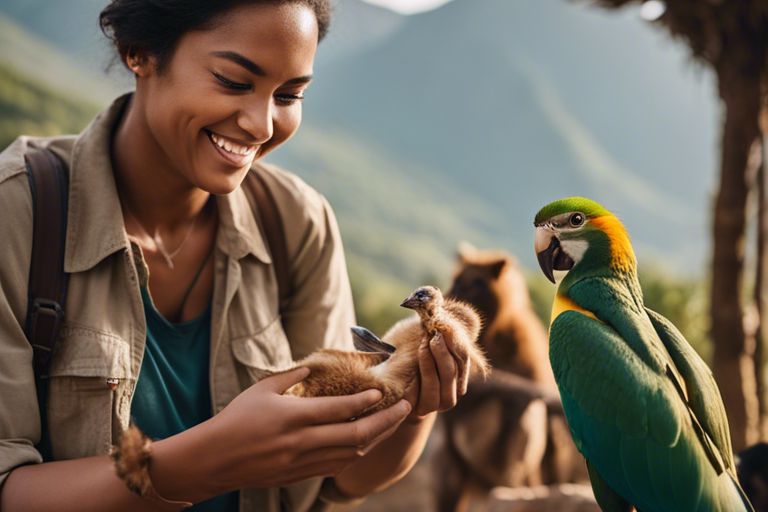You love animals, and traveling abroad is one of your passions. Volunteering with animals can be a rewarding experience, but it’s crucial to do your research and choose a reputable organization.
Working with animals abroad can be challenging yet incredibly fulfilling, so be prepared for hard work and potential emotional moments. Keep in mind, your efforts can have a positive impact on the lives of animals in need around the world.

Key Takeaways:
- Research before committing: It is important to thoroughly research the organization or program before volunteering with animals abroad to ensure they have ethical practices and are truly in need of help.
- Be prepared for the challenges: Volunteering with animals abroad can be emotionally challenging and physically demanding, so it’s important to be prepared for the realities of the work before committing.
- Make a positive impact: By volunteering with animals abroad, you have the opportunity to make a meaningful contribution to the well-being of animals in need and help support conservation efforts around the world.
Getting Started
Understanding Your Motivations
The first step in volunteering with animals abroad is to understand your motivations. You must ask yourself why you want to work with animals in a different country.
Are you passionate about wildlife conservation, or do you simply love spending time with animals? Reflecting on these questions will help you choose the right volunteer program that aligns with your interests and goals.
Identifying Your Skills and Interests
Clearly identify your skills and interests when it comes to working with animals. Are you good at handling and caring for animals? Do you have experience in veterinary care or wildlife research?
Understanding your strengths will enable you to find a volunteer opportunity where you can make the most impact and contribute effectively to the cause.
It’s important to note that your skills and interests don’t have to be limited to animal-related activities. You may have other skills such as photography, social media management, or teaching that can also be valuable to organizations working with animals.
Researching Organizations and Destinations
Before you commit to a volunteer program, take the time to research different organizations and destinations. Look for reputable organizations that have a proven track record of ethical animal care and conservation efforts.
Consider the location and type of animals you would be working with to ensure it aligns with your interests and comfort level. Reading reviews and testimonials from past volunteers can give you valuable insights into what to expect.
Another important factor to consider when researching organizations and destinations is the level of support and training provided. You want to ensure that you will receive proper guidance and instruction to carry out your responsibilities effectively and safely while volunteering abroad.

Choosing the Right Program
It’s imperative to choose the right volunteer program when looking to work with animals abroad. There are various factors to consider before making a decision.
Factors to Consider: Cost, Duration, and Type of Work
- Cost: Consider the program fees, accommodations, and any other additional expenses.
- Duration: Decide on the length of time you can commit to volunteering.
- Type of Work: Determine the kind of tasks you’re comfortable with, such as animal care, conservation, or rescue efforts.
Any decision should align with your budget, availability, and comfort level.
Tips for Evaluating Organizations and Their Credentials
While researching organizations, it’s crucial to evaluate their credibility to ensure a meaningful and responsible volunteer experience.
- Reviews: Look for reviews and testimonials from past volunteers to gauge their experiences.
- Affiliations: Check if the organization is affiliated with reputable bodies in the animal welfare sector.
- Transparency: Ensure the organization is transparent about its projects, goals, and financial allocation.
Knowing these details will help you choose a trustworthy and impactful volunteering opportunity.
How to Find Programs That Align with Your Goals
Programs that align with your goals can provide a fulfilling and rewarding experience. Research organizations that share your beliefs and values when it comes to animal welfare and conservation efforts.
To find the right fit, consider factors such as the organization’s mission, the specific activities involved, and the overall impact of the program on the local animal population. This will ensure that your efforts contribute positively to the cause.
Preparing for Your Trip
Vaccinations, Medications, and Health Considerations
While preparing for your volunteer trip abroad, it is imperative to consider your health and well-being. Make sure you are up to date on all routine vaccinations and inquire about any additional vaccinations required for the specific country you are traveling to.
Consult with a healthcare provider or travel medicine specialist to discuss recommendations based on your health history and the region you will be visiting. Remember to pack an ample supply of any medications you take regularly, as well as a basic first aid kit for minor ailments.
Obtaining Necessary Documents: Visas, Passports, and Insurance
Insurance is crucial when traveling abroad, especially when volunteering with animals. Look into travel insurance that covers medical expenses, emergency evacuation, and trip cancellations.
Additionally, ensure your passport is valid for at least six months beyond your intended stay and check if you need a visa for entry into the country. Research the specific visa requirements for volunteers, as they may differ from standard tourist visas.
Understanding the importance of having proper insurance is key to protecting yourself in case of unexpected situations. Having comprehensive coverage can give you peace of mind while volunteering, knowing that you are financially protected in case of emergencies.
Packing Essentials for Your Trip
Documents such as your passport, visa, travel insurance information, and contact numbers should be kept in a secure and easily accessible place during your trip. Carry copies of these documents in a separate location as a backup.
Pack light, breathable clothing suitable for the climate of the destination, and don’t forget items like sunscreen, insect repellent, and a reusable water bottle. It’s also a good idea to pack sturdy, closed-toe shoes for working with animals and any specific gear recommended by the volunteer organization.
Another imperative item to pack is a small first aid kit with basic medical supplies. Include items like bandages, antiseptic wipes, pain relievers, and any prescription medications you may need.
Being prepared with these imperatives can help you stay healthy and safe while volunteering with animals abroad.
Cultural Immersion and Adaptation
Understanding Local Customs and Etiquette
All around the world, cultures have unique customs and etiquette that are important to understand and respect. One key aspect of volunteering with animals abroad is immersing yourself in the local culture.
Take the time to learn about the customs and etiquette of the country you are visiting. This will not only help you make a positive impact but also allow you to form stronger connections with the local community.
How to Overcome Language Barriers and Cultural Differences
While volunteering abroad, you may encounter language barriers and cultural differences that can make communication challenging. While it may seem daunting at first, don’t be afraid to immerse yourself in the local language and customs.
Respectfully ask questions and seek help when needed. Learning a few key phrases in the local language can go a long way in bridging the communication gap and showing your willingness to engage with the community.
To truly overcome language barriers and cultural differences, consider taking language classes or working with a translator. These resources can greatly enhance your volunteering experience and help you connect with the local community on a deeper level.
Tips for Staying Safe and Healthy While Abroad
- Stay informed: Research the local healthcare system and emergency services.
- Stay hydrated: Carry a reusable water bottle with you at all times.
- Stay vigilant: Be aware of your surroundings and trust your instincts.
One important aspect of volunteering abroad is prioritizing your safety and health. Make sure to familiarize yourself with any health risks in the area and take necessary precautions.
This will ensure that you can focus on your volunteer work and make the most of your experience. Bear in mind, that your well-being is key to your ability to contribute effectively to the cause you are passionate about.
Language
Importantly, remember that volunteering with animals abroad is not just about the work you do – it’s also about building relationships and immersing yourself in a new culture. By understanding the local customs and etiquette, overcoming language barriers, and staying safe and healthy, you can make a meaningful impact while creating unforgettable memories.

Making the Most of Your Experience
Setting Realistic Expectations and Goals
Your experience volunteering with animals abroad can be incredibly rewarding, but it’s imperative to set realistic expectations and goals. Understand that not every day will be glamorous or full of heartwarming moments.
There may be challenging tasks, such as cleaning cages or assisting in medical procedures, that are necessary for the animal’s well-being. By setting realistic expectations, you can better prepare yourself mentally for the range of experiences you may encounter.
How to Be an Effective Volunteer: Tips and Strategies
On your journey as a volunteer with animals abroad, there are several ways you can ensure you are making the most impact possible. First and foremost, always listen to and follow the instructions given by the local staff or project coordinators.
They have valuable knowledge and expertise that can guide you in your efforts to help the animals. Additionally, be proactive in seeking out ways to contribute – whether it’s through assisting with daily care tasks, helping with enrichment activities, or sharing your unique skills and knowledge.
- Stay open-minded and willing to learn from others.
- Communicate effectively with the local team and fellow volunteers.
- Take care of yourself and prioritize your well-being to avoid burnout.
Knowing these tips and strategies can help you maximize your impact and ensure a fulfilling volunteer experience.
Building Relationships with Locals and Fellow Volunteers
The relationships you build with locals and fellow volunteers can greatly enrich your experience working with animals abroad. The locals can provide valuable insights into the culture, environment, and animal welfare issues specific to the region.
By engaging with them, you can gain a deeper understanding of the challenges they face and work together towards positive outcomes for the animals. Additionally, bonding with fellow volunteers can create a strong support system and foster a sense of community during your time abroad.
To foster these relationships, take the initiative to engage in conversations, participate in group activities, and show appreciation for everyone’s contributions. These connections can be long-lasting and leave a lasting impact on both your volunteer experience and personal growth.
Overcoming Challenges and Staying Motivated
Dealing with Homesickness, Fatigue, and Frustration
Keep in mind that it’s normal to feel homesick, tired, or frustrated at times while volunteering abroad. Your surroundings might be unfamiliar, the work physically demanding, or communication difficult. It’s important to acknowledge these feelings and reach out for support.
Remember that you are not alone in experiencing these emotions, and seeking advice from fellow volunteers or project coordinators can help you navigate through challenging times.
How to Stay Engaged and Focused on Your Goals
For frustration and moments of feeling overwhelmed, focus on the impact you are making. Remind yourself of the reasons you chose to volunteer with animals abroad – to make a difference in their lives and contribute to conservation efforts.
Setting small, achievable goals can also help you stay engaged and motivated throughout your volunteer experience.
Moreover, keeping a journal to document your daily successes and challenges can serve as a valuable tool to reflect on your progress. This practice can help you stay connected to your initial motivations and see how far you have come since the beginning of your volunteering journey.
Celebrating Your Achievements and Progress
Overcoming obstacles and challenges while volunteering abroad is a significant accomplishment. Celebrate your achievements, no matter how small they may seem.
Recognize the positive impact you are making, not only for the animals but for the community and environment as a whole. Take time to acknowledge your resilience, dedication, and growth throughout this experience.
A little celebration, such as treating yourself to a local meal or taking a day off to explore the area, can recharge your motivation and reignite your passion for the work you are doing. Do not forget, each step forward is a step toward a better future for the animals and the planet.
To wrap up
So if you have a passion for animals and want to make a difference, volunteering abroad can be a rewarding experience. By following these steps and tips, you can ensure that your volunteer work with animals is ethical, impactful, and fulfilling. Remember to do thorough research, choose a reputable organization, and be prepared for the physical and emotional demands of the work.
Ultimately, volunteering with animals abroad is not only a chance to help those in need but also an opportunity for personal growth and cultural exchange. Your efforts can contribute to the well-being of animals and communities around the world, leaving a lasting positive impact. So, pack your bags, prepare to work hard, and get ready for an unforgettable volunteer experience!
Frequently Asked Questions
Why should I volunteer with animals abroad?
Volunteering with animals abroad is a great way to make a positive impact on animal welfare, contribute to conservation efforts, and help animals in need. It also provides an opportunity to gain valuable experience, learn about different cultures, and make lifelong memories.
What are the requirements to volunteer with animals abroad?
Requirements vary depending on the organization and location, but most opportunities require volunteers to be at least 18 years old. Some programs may have specific skills or experience requirements, such as animal handling or veterinary training. It’s important to research and choose a reputable organization that aligns with your interests and goals.
How can I find legitimate volunteer opportunities with animals abroad?
To find legitimate volunteer opportunities with animals abroad, research reputable organizations that have a proven track record of ethical practices and positive reviews from past volunteers. Consider factors such as the organization’s mission, transparency, financial responsibility, and impact. Websites like Volunteer World, Go Overseas, and GoAbroad can also help you find vetted volunteer programs.



